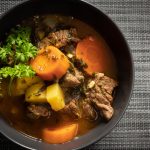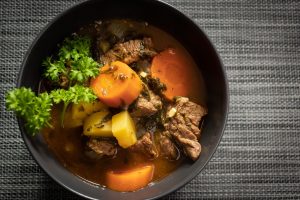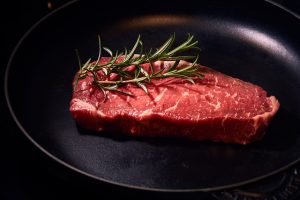“Plant-Powered Moo Shu: 5 Vegetarian Alternatives to Beef”
Plant-Powered Moo Shu: 5 Vegetarian Alternatives to Beef
In a world where sustainability and ethical eating are gaining more attention, the demand for vegetarian alternatives to beef is on the rise. With concerns about the environmental impact of meat production and the welfare of animals, many individuals are opting for plant-powered options that not only satisfy their taste buds but also align with their values. One such dish that has gained popularity is Moo Shu, a Chinese stir-fry dish traditionally made with beef. However, with the plethora of vegetarian alternatives available today, you can enjoy this delicious meal guilt-free. Let’s explore five vegetarian alternatives that will inspire you to give up beef and embrace a more sustainable and compassionate way of eating.
- Tempeh: Made from fermented soybeans, tempeh is a versatile and protein-rich alternative to beef. Its firm texture and nutty flavor make it an excellent substitute in Moo Shu. Marinated in soy sauce, ginger, and garlic, tempeh absorbs flavors beautifully and provides a satisfying chewiness that mimics beef. Loaded with essential amino acids, vitamins, and minerals, tempeh is not only good for your taste buds but also for your overall health.
- Seitan: Also known as wheat meat, seitan is a high-protein option that closely resembles the texture and taste of beef. Made from wheat gluten, this meat substitute can be seasoned and cooked to perfection in a Moo Shu dish. Its ability to absorb flavors makes it a popular choice among vegetarians and vegans looking for a hearty meat alternative.
- Portobello Mushrooms: With their meaty texture and umami flavor, portobello mushrooms are an excellent choice for Moo Shu. When marinated and grilled, these mushrooms become tender and juicy, providing a satisfying mouthfeel similar to beef. Packed with antioxidants and essential nutrients, portobello mushrooms offer a healthy and delicious alternative to traditional beef.
- Jackfruit: Known as the “vegetable meat,” jackfruit is a tropical fruit that can be transformed into a convincing meat substitute. When cooked, its fibrous texture mimics pulled pork or shredded beef, making it an ideal choice for Moo Shu. The mild taste of jackfruit allows it to absorb the flavors of the dish, resulting in a savory and satisfying meal that will leave you craving more.
- Lentils: A staple in many vegetarian diets, lentils are a protein-packed legume that can be used as a substitute for beef in Moo Shu. Whether cooked and seasoned as a ground meat alternative or left whole for added texture, lentils offer a nutritious and budget-friendly option. Rich in fiber, vitamins, and minerals, lentils not only contribute to a sustainable diet but also promote overall well-being.
By exploring these five vegetarian alternatives to beef in your Moo Shu dish, you can embark on a culinary journey that not only satisfies your taste buds but also aligns with your values. Choosing plant-powered options allows you to reduce your environmental footprint, support animal welfare, and improve your health. So, why not give these alternatives a try and discover the endless possibilities of sustainable and compassionate eating? Your taste buds and the planet will thank you.
“Delicious Meat-Free Moo Shu: Try These Vegetarian Options”
In a world dominated by meat-based dishes, finding vegetarian options that are not only delicious but also flavorful can sometimes feel like an impossible task. However, fear not! We have discovered a delightful alternative to the classic Moo Shu dish that will leave your taste buds dancing with joy. So put on your apron, gather your ingredients, and get ready to embark on a culinary adventure that will redefine your perception of vegetarian cuisine.
The key to creating a meat-free Moo Shu lies in the perfect combination of ingredients. Instead of the traditional pork or chicken, we will be using a medley of vegetables that will provide both texture and taste. Think crisp and vibrant bell peppers, earthy mushrooms, and tender cabbage. These ingredients not only bring a wide array of flavors to the table but also pack a nutritional punch, making this dish a win-win for both your taste buds and your health.
To infuse our vegetarian Moo Shu with a burst of mouthwatering flavors, we will be incorporating a variety of seasonings and sauces. Fresh ginger and garlic will add a delightful kick, while soy sauce and hoisin sauce will provide that distinct umami taste we all crave. Don’t be afraid to experiment with different combinations of spices and sauces to create a personalized version that suits your palate perfectly.
Now, let’s talk about the star of the show – the pancakes. Traditionally, Moo Shu is served with thin, delicate pancakes that act as a vessel for the flavorful filling. To keep our vegetarian version as close to the original as possible, we recommend using store-bought flour tortillas or making your own thin pancakes using a simple flour and water mixture. Just remember to roll them out nice and thin for that authentic Moo Shu experience.
Once you have gathered all your ingredients and prepared your pancakes, it’s time to bring it all together. In a hot wok or skillet, sauté your vegetables with a splash of oil until they are crisp-tender. Add in your seasonings and sauces, allowing them to coat the vegetables and infuse them with their mouthwatering flavors. Finally, it’s time to assemble your Moo Shu. Lay a pancake flat, spoon in a generous amount of the vegetable filling, and roll it up tightly. Repeat until all your pancakes are filled and ready to be devoured.
As you take that first bite into your vegetarian Moo Shu, you will be pleasantly surprised by the explosion of flavors that greet your senses. The combination of the crisp vegetables, savory seasonings, and delicate pancakes will leave you wondering why you hadn’t tried this meat-free alternative sooner. So go ahead, embrace the world of vegetarian cuisine, and discover the joy of a delicious, meat-free Moo Shu that will undoubtedly inspire you to explore more creative and flavorful vegetarian options.
“From Tofu to Tempeh: Exploring Vegetarian Alternatives for Moo Shu Beef”
From Tofu to Tempeh: Exploring Vegetarian Alternatives for Moo Shu Beef
In recent years, there has been a significant rise in the number of people adopting vegetarian and vegan diets. Whether it’s due to health concerns, ethical reasons, or a desire to reduce their carbon footprint, individuals are actively seeking out meatless alternatives that still deliver on taste and texture. One classic dish that has been a staple in Chinese cuisine is Moo Shu Beef. However, with the rise of plant-based eating, it’s time to explore vegetarian alternatives that can inspire and delight even the most discerning palates.
When it comes to replacing beef in Moo Shu, tofu and tempeh are two excellent options that can elevate the dish to new heights. Both tofu and tempeh are made from soybeans and are known for their versatility and ability to absorb flavors. Let’s dive deeper into these two alternatives and discover the endless possibilities they offer.
Tofu, often referred to as bean curd, is a staple in many Asian cuisines. Made by coagulating soy milk and pressing it into solid blocks, tofu is known for its smooth and creamy texture. When marinated and cooked properly, tofu can take on the flavors of any dish it is incorporated into, making it an ideal candidate for Moo Shu Beef. Its mild taste allows for the bold flavors of the sauce and other ingredients to shine through, while its softness mimics the tenderness of beef. Additionally, tofu is an excellent source of plant-based protein, making it a nutritious alternative for those looking to maintain a balanced diet.
Tempeh, on the other hand, is a lesser-known soy-based product that deserves more attention. Originating from Indonesia, tempeh is made by fermenting soybeans and binding them into a firm cake-like form. The fermentation process gives tempeh a unique nutty flavor and a firm, chewy texture. When marinated and cooked, tempeh develops a savory taste that can rival that of beef. Furthermore, tempeh is high in protein and contains beneficial probiotics, making it a health-conscious choice for those seeking a well-rounded diet.
The great thing about both tofu and tempeh is that they can be prepared in various ways to suit individual preferences. From stir-frying to grilling, these meat alternatives lend themselves well to different cooking techniques, allowing for endless culinary experimentation. Whether you’re a seasoned chef or an amateur home cook, exploring the possibilities of tofu and tempeh in Moo Shu Beef can be an exciting and inspiring culinary adventure.
In conclusion, as we continue to explore vegetarian alternatives, it’s important to find options that not only satisfy our taste buds but also inspire us to create flavorful and nutritious dishes. Tofu and tempeh offer us an opportunity to reimagine classic recipes like Moo Shu Beef, infusing them with new life and creativity. So, let’s embrace these plant-based alternatives and embark on a journey of culinary exploration that not only benefits our health but also the health of our planet.
“Moo Shu Reinvented: Discovering the Best Plant-Based Substitutes”
Moo Shu Reinvented: Discovering the Best Plant-Based Substitutes
In recent years, the popularity of plant-based diets has surged, with more and more individuals embracing a lifestyle that is not only better for their own health but also for the environment. As a result, the demand for innovative and delicious plant-based substitutes has skyrocketed, and one dish that has undergone a remarkable transformation is Moo Shu.
Moo Shu, traditionally a Chinese dish made with shredded pork or chicken, has now been reimagined with plant-based ingredients that not only mimic the taste and texture of the original meat but also deliver a burst of flavors that will leave you craving for more. This reinvention of Moo Shu is not only a celebration of culinary creativity but also an inspiration for those who are seeking to make a positive impact on their health and the planet.
One of the key components of Moo Shu is the protein-rich meat, which has now been replaced with a variety of plant-based substitutes that are equally satisfying. Jackfruit, for instance, has emerged as a popular choice due to its fibrous texture and ability to absorb flavors. When cooked and shredded, jackfruit resembles pulled pork, and when combined with the traditional Moo Shu sauce, it creates a mouthwatering dish that even meat-lovers won’t be able to resist.
Another plant-based substitute that has found its way into the reinvented Moo Shu is tofu. Tofu, known for its versatility and ability to absorb flavors, can be marinated and stir-fried to create a delectable meat-like texture. Its neutral taste allows it to take on the flavors of the sauce and other ingredients, making it a perfect replacement for pork or chicken in this dish.
The reinvention of Moo Shu doesn’t stop at the protein component. The traditional recipe calls for the inclusion of vegetables such as cabbage, carrots, and mushrooms, which provide a wholesome and nutritious element to the dish. To add a twist to the traditional recipe, various leafy greens like kale or spinach can be incorporated, adding an extra punch of vitamins and minerals.
The true magic of this reinvented Moo Shu lies in the sauce. A well-balanced blend of soy sauce, hoisin sauce, and other flavorful ingredients creates a symphony of tastes that will transport your taste buds to a whole new level. This sauce, when combined with the plant-based protein and vegetables, creates a harmonious and inspiring dish that showcases the possibilities of plant-based cooking.
The reinvention of Moo Shu is not just about substituting meat with plant-based ingredients; it is about reimagining a traditional dish in a way that is both innovative and inspirational. By embracing plant-based substitutes, we not only contribute to our own well-being but also take a step towards a more sustainable future. The possibilities are endless, and this reinvented Moo Shu is just the beginning of a culinary revolution that celebrates the power of plants.
So, whether you’re a dedicated plant-based eater or simply looking for new and exciting flavors to explore, give this reinvented Moo Shu a try. Let it inspire you to think outside the box and discover the best plant-based substitutes that can transform any dish into a culinary masterpiece.
“Vegetarian Moo Shu: 5 Mouthwatering Meatless Options to Try Today”
Are you a vegetarian looking for a flavorful and satisfying meal? Look no further! In this article, we will explore five mouthwatering meatless options for you to try today. Get ready to be inspired by these delectable vegetarian Moo Shu dishes that will surely leave you craving for more.
- Tofu Moo Shu: Tofu, a versatile plant-based protein, takes the center stage in this variation. Marinated in a savory blend of soy sauce, ginger, and garlic, the tofu is then stir-fried with an assortment of colorful vegetables such as cabbage, carrots, and mushrooms. The combination of textures and flavors creates a delightful experience that will please even the most discerning palate.
- Mushroom Moo Shu: For those who crave an earthy taste, mushroom Moo Shu is the perfect choice. Sautéed mushrooms, such as shiitake or oyster mushrooms, provide a rich and meaty texture that pairs perfectly with the traditional Moo Shu sauce. Packed with umami flavor, this dish will surely satisfy your cravings and leave you feeling fully satisfied.
- Egg Moo Shu: If you’re looking to add a protein-packed twist to your Moo Shu experience, look no further than egg Moo Shu. Scrambled eggs are cooked alongside a medley of vegetables, adding a creamy and satisfying element to the dish. The combination of fluffy eggs and crunchy vegetables creates a delightful contrast that will leave you coming back for more.
- Seitan Moo Shu: Seitan, also known as wheat meat, is a popular meat substitute for vegetarians and vegans. In Moo Shu, seitan is marinated and stir-fried to perfection, resulting in a dish that closely mimics the texture and flavor of traditional meat-based Moo Shu. With its chewy and satisfying bite, seitan Moo Shu is a must-try for those looking for a hearty and protein-rich meal.
- Vegetable Moo Shu: Last but certainly not least, vegetable Moo Shu offers a medley of colorful and vibrant vegetables that celebrate the essence of vegetarian cuisine. From crisp bell peppers to tender snow peas, each vegetable brings its unique flavor and texture to the dish. Tossed in a tangy and savory sauce, this Moo Shu variation is a true celebration of nature’s bounty.
In conclusion, these five mouthwatering meatless options for Moo Shu are sure to tantalize your taste buds and leave you inspired to explore the world of vegetarian cuisine. Whether you prefer tofu, mushrooms, eggs, seitan, or a combination of colorful vegetables, there is a Moo Shu variation to suit your preferences. So why wait? Try one of these delicious options today and embark on a delectable journey towards a more sustainable and compassionate way of eating.












